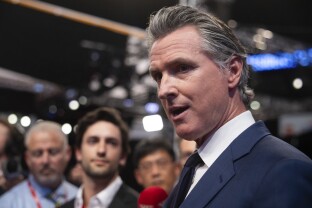California — and allied states — will be allowed to ban the sale of new gas cars eventually, Joe Biden’s Environmental Protection Agency announced Wednesday, teeing up yet another electric vehicle fight for Donald Trump when he takes office.
The new waiver is the latest in a series of decisions from the Biden administration designed to promote the transition from gas-powered to electric vehicles. If California follows through, Gov. Gavin Newsom will very likely take the mantle he’s been jockeying for since Trump won as the country’s opposition leader on climate change.
“There are two levels of an executive politics game here. One we can think of is Biden vs. Trump. And then the other one will be Trump vs. Newsom,” said Barry Rabe, an expert on environmental regulations and executive action at the University of Michigan. “This will continue to be a battle in the courts. California and allied states will push as hard as possible.”
Newsom has already pledged to bring back California’s tax incentives for EVs if Trump removes the federal tax breaks, as he’s promised to do.
California, and the additional states that have signed on to its proposal, including Oregon, New York, and Colorado, want to ban the sale of all new gas cars by 2035. That regulation is stricter than the one set by the EPA for the rest of the country, but California has special permission under the Clean Air Act to request stricter rules.
“California has longstanding authority to request waivers from EPA to protect its residents from dangerous air pollution coming from mobile sources like cars and trucks,” EPA Administrator Michael S. Regan said in a press release. The EPA granted two of the six waivers California wanted (and is still considering the rest), including the one that would lead to the gas car ban.
Though the waiver comes just one month before Trump takes office, neither his incoming administration nor the Republican Congress can immediately reverse it. The Congressional Review Act, a legislative strategy Republicans embraced to quickly nix regulations made right before they took power, does not apply here, according to the Government Accountability Office. Instead, the administration will need to go through a regulatory rollback process and then defend that process in court, in the inevitable scenario California sues.
The EPA cannot deny California a waiver just because it doesn’t align with White House policy: It must be approved unless it violates a very limited set of rules, opening many doors for California to challenge any rollback or revocation.
The coming fight is likely to be long and aggressive.
California has already faced legal challenges over its special waiver power under the Clean Air Act. On Monday, just two days before the Biden administration announced the waiver, the Supreme Court dismissed a petition from other states (led by Ohio) to challenge California’s special treatment on constitutional grounds.
Because California has the eighth largest economy in the world, an aggressive ban on gas car sales would ripple through the U.S. car market.
“Every other state has the option of sticking with the federal standard or the California standard, that’s what produces this sort of patchwork quilt that further complicates an industry that by its definition is mobile and crosses over state and national boundaries,” Rabe said. “It’s just a huge challenge.”
One of the largest vehicle industry groups called it a “program that is an unaccountable, unachievable regulatory wormhole” in a memo published last week.
“It will decrease overall vehicle options and choice for customers. It will force consumers to cross state lines and purchase vehicles in states that don’t follow the program,” the Alliance for Automotive Innovation said.
The group suggested that Elon Musk’s Tesla could be one of the greatest beneficiaries of California’s plan, not just because of its own vehicle sales but also because the company will be over-complying and can sell credits to other car companies, making an additional profit.
“Payments go directly to Tesla and other automakers ‘over complying’ with the mandates because … they only sell EVs. Tesla’s revenue from regulatory credits in the third quarter was $739 million — the second highest quarter in company history,” the Alliance wrote.
But even if California can successfully defend its gas car ban in court, the justification and motivation for the EV transition currently rests on a wide array of federal policies, including tax incentives for EV purchasers, EPA tailpipe emissions rules, incentives for manufacturers and battery makers and even trade policy. Trump has threatened to change or remove nearly all of these policies.
Despite those many aggressive, intertwined policies, EV sales are already slower than expected in California. EVs made up only 26.4% of the new car market this year, well below the 35% target for next year laid out in California’s plan for the ban by 2035.
“Next generation vehicle technology, the future of electric vehicles, a lot of this is embedded in other policies that are also going to be important,” Rabe said. “Will California be able to fill that gap?”
—
Anna Kramer is a reporter at NOTUS.
Sign in
Log into your free account with your email. Don’t have one?
Check your email for a one-time code.
We sent a 4-digit code to . Enter the pin to confirm your account.
New code will be available in 1:00
Let’s try this again.
We encountered an error with the passcode sent to . Please reenter your email.


